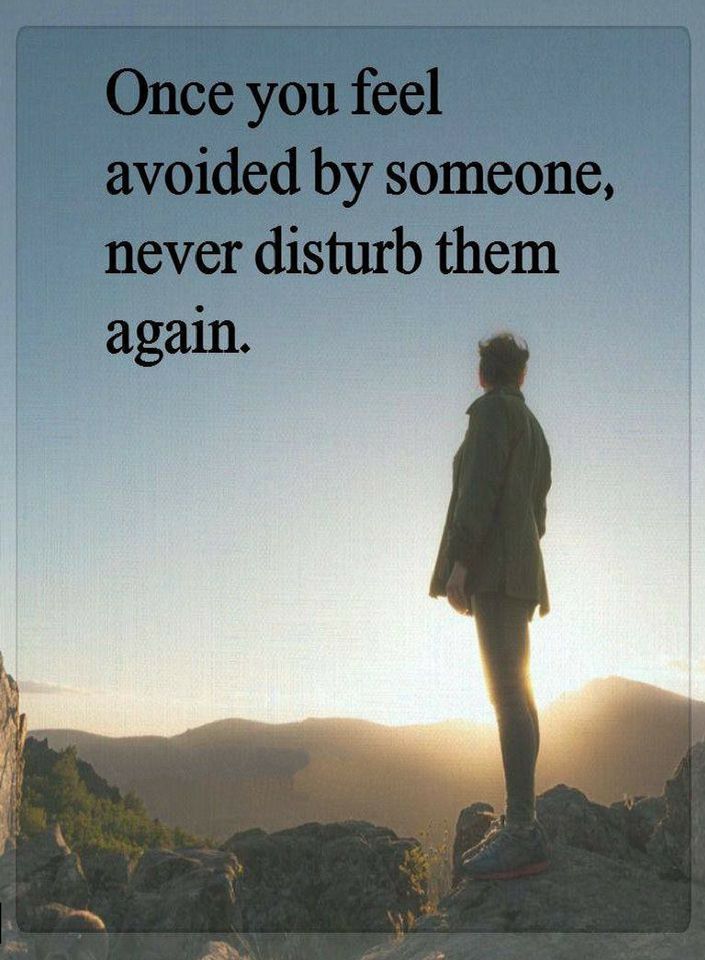Understanding Emotions: Once You Feel Avoided By Someone
Feeling avoided by someone can be a deeply unsettling experience. Whether it's a friend, a colleague, or a loved one, the emotions that arise can range from confusion to hurt. It's natural to seek clarity and understanding in these situations, but often, we find ourselves caught in a whirlwind of thoughts and feelings. The uncertainty can lead to a spiral of self-doubt and anxiety, making it challenging to navigate our relationships effectively.
When we perceive that someone is avoiding us, our minds can race with possibilities. What did I do wrong? Is it something I said? These questions can plague us as we try to make sense of the distance. Understanding the dynamics of avoidance can help us address our feelings and potentially mend the relationship. It's essential to recognize that while avoidance can feel personal, it often stems from broader issues that may have little to do with us.
In this article, we will explore the various facets of feeling avoided by someone, including the emotions involved, the potential reasons behind their behavior, and how to approach the situation. By gaining insight into these feelings, we can learn to cope better and possibly restore our connections with those we care about.
What Does It Mean When You Feel Avoided by Someone?
Feeling avoided typically indicates that there is a perceived distance or lack of engagement from the other person. This sensation can be disheartening, leading us to question our worth or the state of the relationship. Understanding the emotional implications of this feeling can empower us to respond more constructively.
Why Do People Avoid Others?
There are numerous reasons why someone might choose to avoid another person. Some common reasons include:
- Personal issues: They may be dealing with stress, anxiety, or personal challenges.
- Conflict: Past disagreements can create a rift, leading to avoidance.
- Different priorities: As life changes, people might drift apart due to differing interests or commitments.
- Fear of confrontation: Some individuals avoid others to escape uncomfortable conversations.
How Can You Tell If Someone Is Avoiding You?
Recognizing avoidance can be subtle but may manifest in various ways. Signs include:
- Reduced communication: They may take longer to respond to messages or calls.
- Avoiding eye contact: In face-to-face interactions, they might look away or seem distracted.
- Canceling plans: Frequent cancellations can indicate a desire to distance themselves.
- Short or dismissive replies: Their responses may lack warmth or engagement.
Once You Feel Avoided by Someone, How Should You Respond?
When grappling with the feeling of being avoided, your response can significantly impact the relationship. Consider these steps:
- Reflect on your feelings: Understand your emotions and what triggers them.
- Communicate openly: If appropriate, reach out to discuss your feelings with the person.
- Give them space: Sometimes, people need time away to sort through their feelings.
- Focus on self-care: Engage in activities that nurture your well-being and confidence.
Can You Repair a Relationship After Feeling Avoided?
Yes, it is possible to repair relationships where avoidance has occurred. This process often involves:
- Open dialogue: Creating a safe space for honest conversation can help address misunderstandings.
- Understanding perspectives: Listening to the other person's side can foster empathy.
- Taking responsibility: If you contributed to the avoidance, acknowledging your part can pave the way for healing.
What If the Avoidance Continues?
If avoidance becomes a persistent pattern, it may be necessary to evaluate the relationship. Consider these factors:
- Is the relationship healthy for you?
- Are there patterns of behavior that need addressing?
- Can you accept the distance and move on?
Once You Feel Avoided by Someone, How Can You Move Forward?
Moving forward after feeling avoided involves both acceptance and proactive steps. Here are some strategies:
- Accept your feelings: Acknowledge that feeling hurt or rejected is valid.
- Engage in self-reflection: Consider what you’ve learned from the experience.
- Seek support: Talk to friends or a therapist to process your feelings.
- Invest in new connections: Sometimes, nurturing new relationships can be healing.
Conclusion: Embracing the Journey After Feeling Avoided
Feeling avoided by someone can be an emotionally charged experience, but it also presents an opportunity for growth and understanding. By examining the reasons behind avoidance and reflecting on your feelings, you can take steps to either mend the relationship or move forward with confidence. Remember, relationships are complex, and navigating them requires patience, empathy, and self-awareness.
```
Exploring The Dynamic World Of MSNBC Anchors
Unraveling The Legacy Of The Miami Dolphins Head Coach
Unveiling The Shapiro Sister: A Journey Through Family And Fame


